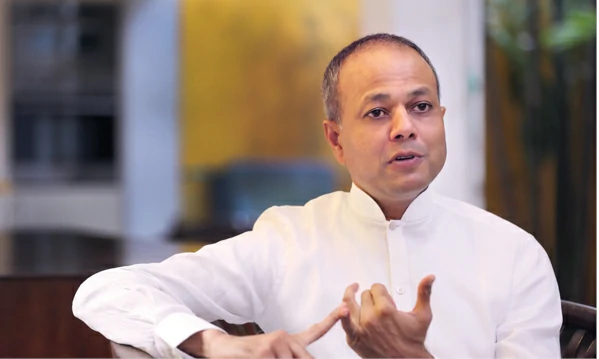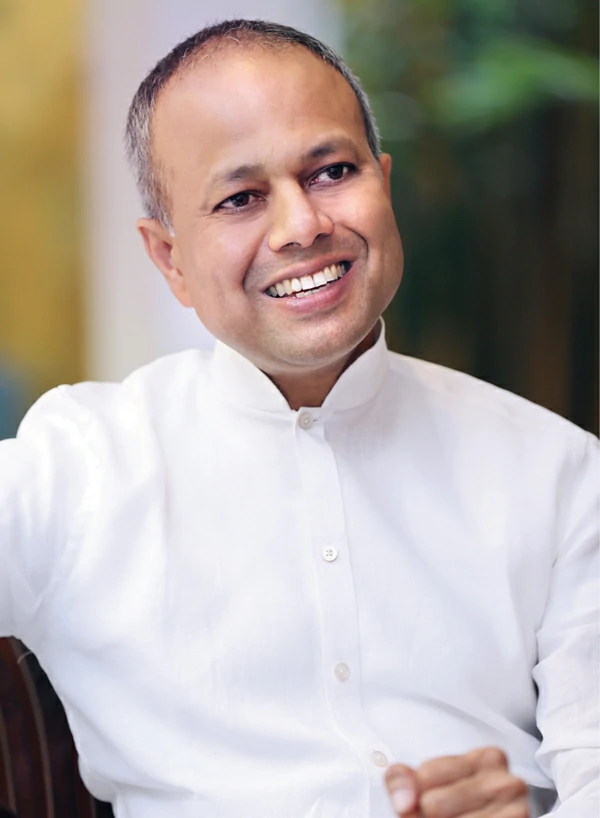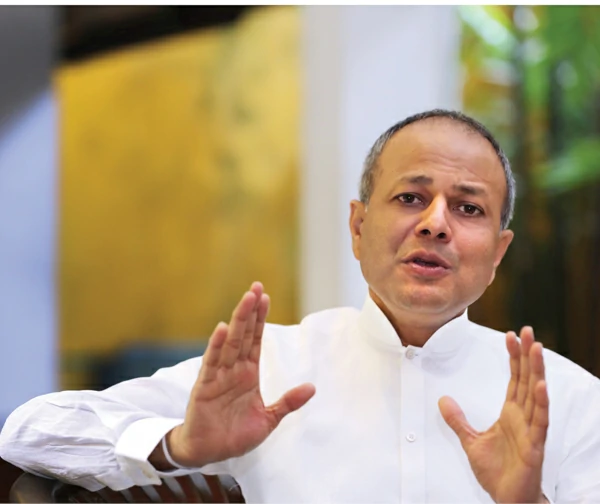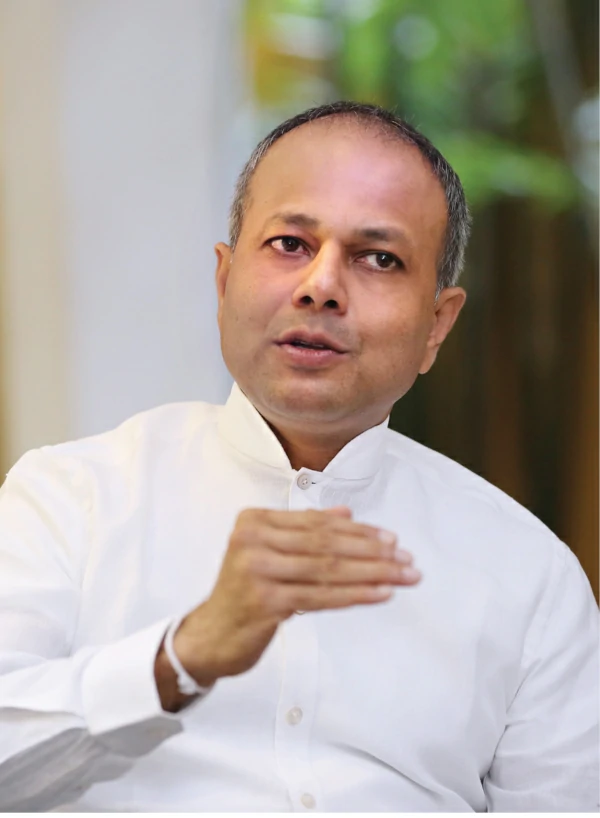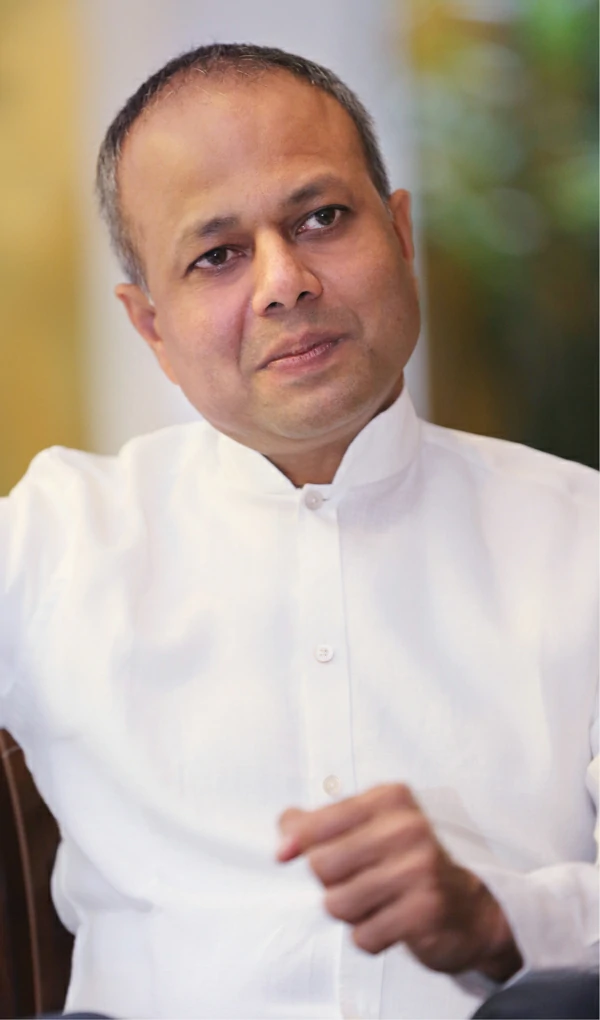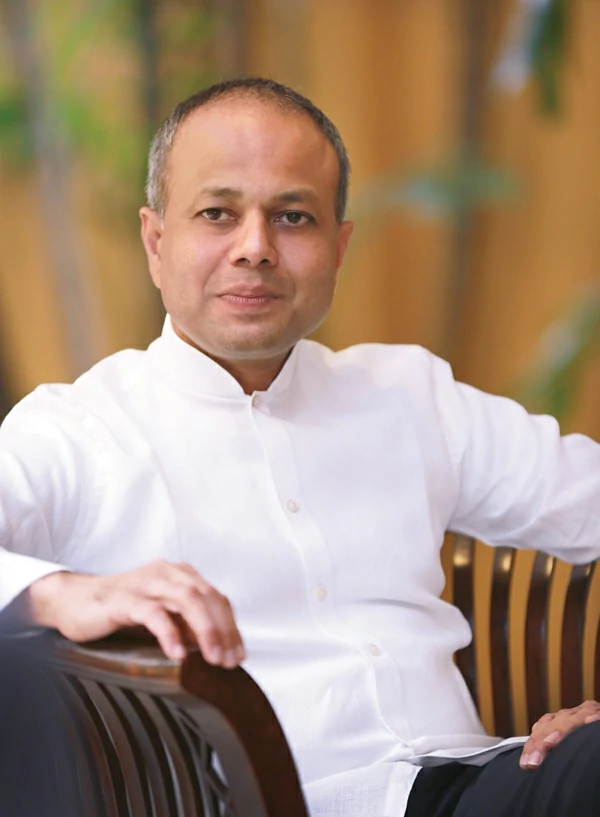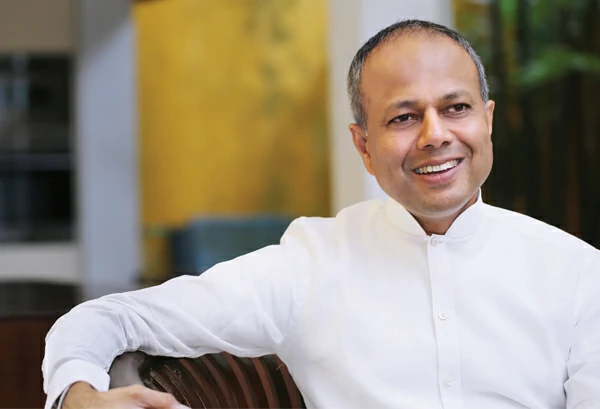
Sagala Ratnayaka is the Minister of Law and Order and Southern Development. He is also the Chief of Staff of Prime Minister Ranil Wickremesinghe. He is a significant member of the current government and the United National Party. Minister Sagala Ratnayaka has great responsibility on his shoulders. From ensuring that the Prime Minister’s schedule is organised with close regard to his safety to involving himself with matters of policy and implementation, the Minister must also make certain that his Ministry delivers on the promises made. As he works very closely with the Prime Minister, the Minister can be referred to as a trouble-shooter within the Party as well as the government in matters of politics. He represents one of the most difficult electorates in the country – Deniyaya, and the entire Matara district as a whole. While he could have chosen an easier electorate in terms of votes to contest from, he firmly believes that one should represent where one can call home. Minister Sagala Ratnayaka discusses the new direction taken where national unity is held to be of the utmost importance.
By Udeshi Amarasinghe. Assisted by Keshini De Silva
Photography Mahesh Bandara and Isuru Upeksha
Who is Sagala Ratnayaka?
I started my career in the corporate sector. After completing my primary and secondary education in Colombo, I went to the US for my university degree and returned to Sri Lanka following graduation. I received a few job offers there (the US) but I felt that Sri Lanka was where I wanted to be. I worked at HSBC where I was based in Colombo as well as at offices overseas. Prime Minister Wickremesinghe had just become the UNP leader when I met him after a very long break in 1995. I had first met him at Royal College when I was the head prefect and he was the Minister of Education.
I started getting involved in politics in the periphery by working with the youth movement. I was doing whatever I could during the weekends. However, little did I know that the leader had other plans for me. During the latter part of 1998, he spoke to me about getting directly involved in politics – that is, to leave HSBC and contest on the UNP ticket in Matara District. This scared me because I never thought of myself as being in active politics and I quite enjoyed being in the periphery. My family had been involved in politics for a long time and my uncle had contested and been a member of parliament. My father never had any political inclinations and he helped on the periphery. That was what I had wanted to do as well. My mother did not like the idea of me getting into politics and she opposed it. However, my father was very keen and I feel that he and Mr Wickremesinghe got together and somehow made me get into active politics. I finally made up my mind in February. The Southern Provincial Council elections were to be held in June. I started campaigning in May and by June, I was in the provincial council. That is how my political career started.
I have a firm belief that there is no other country like Sri Lanka. We have so many resources which we can use to make this country an amazing place. And I believe Mr Wickremeisnghe is the one who laid the foundation for that part in Sri Lanka. I supported him then and will continue to do so. I believe that we have to stand by our principles. Of course, there will be times that you have to be mindful and make use of your public relations skills, but principles are important and that is what I am.
I Believe That We Have To Stand By Our Principles. Of Course, There Will Be Times That You Have To Be Mindful And Make Use Of Your Public Relations Skills, But Principles Are Important And That Is What I Am.
What does it mean to represent the Deniyaya electorate and the Matara district?
Deniyaya is my home town and I am the UNP organiser for the Deniyaya electorate. But the electoral system is on district basis; therefore, I represent all of Matara, not only Deniyaya. During the last so many years the party has asked me whether I would like to move my electorate to a more urban electorate such as Weligama. But I turned it down for two reasons: one, that I wanted my base to be where my home is, and two, I felt that I was more of a rural people’s person than urban. Although I relate pretty well to urban people as well because I grew up in Colombo, I always felt that I had to start from my home in Deniyaya. Because I have lived in both settings, I can understand the whole spectrum. It would have been easier for me to represent an urban electorate like Weligama and it would not have been difficult for me to change my electorate as well. But I did not do so because I believe in Deniyaya and I feel that it is my duty to work in this area.
What does it mean to represent them? That is a tough question to answer – because the people of Sri Lanka really don’t know what they have and they are not aware of what to expect from their politicians. As such, most of the time I am caught up in little things rather than looking at the bigger picture. But I am working on building the right team so that we can start working and putting more of our time on the bigger picture. If not, the people will always be short-changed. I’ll keep talking to them and meeting them every day, and I’ll keep them happy talking but they won’t get the benefit of what is out there. That is what we have to do: deliver on our promises. And that’s what I feel that I have and what I want to represent the people for.
Deniyaya is home. How can I go somewhere else, rent a house and say I am going home at the end of the day? In Deniyaya I can do that. I work, and when I go back I can say that I am going home. Deniyaya is where I started and I have a responsibility to do something there. As much as I have a responsibility to the people of Matara they have always voted for me. In the 2010 election I had only 44,000 preferential votes. It went up to 85,000 this time: that is almost double the votes. And this has doubled everywhere in the district. I have big plans for the entire Matara District.
What have you been able to achieve and what are your plans for the Matara District?
What I have been able to achieve is not enough, because much of my time has been spent in the opposition. We spent two years in government. I always thought that was a good two years, because we started the process of reconciliation amongst all the people, but we could not reap the benefits of it. We did not get the opportunity to translate that to what it actually means to the people – their economic development, because we had to leave the government before that. We have got another chance now and we had a wonderful year in 2015. We managed to address the issues of democracy and provide a free and fair life for everyone. Now we have to work on the economic issues, which is a challenge. That is what our target should be.
All These Activities Will Require Us To Design And Build Cities To Accommodate The Workers And To This End We Will Build Modern Cities With Housing, Schools, Hospitals, Recreational Areas And All Other Facilities Required For A City.
My biggest role is the development of the South, and the South is not only Matara District. For the purpose of this Ministry it includes the entire Southern Province. This includes Galle, Matara, Hambantota, Monaragala in the Uva Province, and the two AGA divisions of Kolonna and Embilipitiya in the Ratnapura District. This is a large area with a lot of potential and many people. There is so much that we can do. We are working on a development plan, which will focus on everything. We will bring in the infrastructure that is required for that, but our concentration will not be on the little village water projects or roads – it will be the major infrastructure and the policies that are required to boost the economy. This could be improving the agriculture sector by bringing in technology and encouraging the right kind of crops. If you take rice, for example, we have to grow the right varieties. We have had two bumper crops and we are heading into the third bumper crop. We could not export the excess rice because it was all grown for the Sri Lankan market. We have to have the right mix. Proper planning is essential.
Tourism is a gold mine in the South. When you start at Bentota you move all the way up to Yala and Monaragala. Monaragala has tourism that even the locals don’t know of, there is so much property and history in that area. And when you go interior towards Sinharaja and Embilipitiya, there is so much you can do with tourism. We are establishing tourism zones in the South. We are not looking at quantity but at quality. We are looking at higher-end tourists, who will spend more money and the money will filter out to the people and not just to the large hotel groups. People will be able to participate in this industry. We will encourage boutique hotel-style properties and have a greater focus around the village. Villagers will be able to provide organically-grown produce to the hotels and they can also be guides to the tourists and also provide various other services. Everyone will have a stake and we will take a more participatory approach.
We have many industrial zones in the South. Koggala has been active about 30 years and was established when Prime Minister Ranil Wickremesinghe was Minister of Industries. We have the great challenge of the port and airport in Hambantota. The Colombo harbour and airport in Katunayake are paying for the loans because there is no traffic to the airport and port in Hambantota. We want to make these productive entities. Hambantota has land; the port can be used to create a large industrial zone targeting employment that we have promised. Our government promised a million jobs in 60 months. We are no longer a government that is pushing for low-wage jobs. We will not be selling our people as a low-wage labour industry. We want high wages for our people. Hambantota can actually deliver if we implement the right strategies.
Southern Development will not work alone; we will work with other government agencies and ministries. We will be the coordinating agency.
How will Southern development be part of the National Plan?
On November 5, 2015, the Prime Minister presented Sri Lanka’s economic policy to parliament. We have three ministers in charge of different provinces. The Southern Province overlooks Southern development, the Ministry of Megapolis handles the Western belt, and the Wayamba Ministry overlooks Wayamba development – these are three large areas. Then we have the Ministry of Hindu Cultural Affairs handling the North while the rest of the country will be handled by the Ministry of Economic Development and Policy Implementation that is under the purview of the Prime Minister. We all discuss at the weekly meeting of the Cabinet Committee on Economic Management, which is appointed by the Cabinet. All our plans are presented and coordinated at the meeting. Within the plan, individual projects are selected and approved, which are then presented to the Cabinet for implementation. Therefore you have a process of reporting to the Cabinet on a weekly basis of the decisions or discussions of the Cabinet Committee on Economic Management. That is the main body that will suggest or recommend to Cabinet on what projects should proceed. We have the Ministry of National Planning and Economic Affairs, which handles the overall economic plan.
We have quite a few projects in the pipeline for the South. The aim is to systematically develop the entire area where the living standards of the people are significantly improved by ensuring that this region contributes 20 per cent of GDP.
We will look to all aspects with particular focus on improving exports. In the agriculture sector we are still a primary exporter. The value addition is done in other countries and exported to the end user. We want that value addition to be done in Sri Lanka which will benefit the farmer. One example is cinnamon. We grow 90 per cent of the world’s true cinnamon but the value additions are done in countries like Mexico.
We are also looking at attracting manufacturing companies to set up factories by promoting the geographical proximity to some of the fastest growing markets as well as the favorable export concessions enjoyed by Sri Lanka under various FTAs. We already have interested parties in a free trade zone where many manufacturing companies have shown interest in setting up. There is also a plan for a medical manufacturing city where the whole focus will be on manufacturing products for export exclusively in the medical field.
In all our planning, the environment will be given the highest priority. For example, the elephant habitat issue will be incorporated into the planning process. The Yala national park will be developed and strictly regulated to ensure the sustainability of this valuable asset.
On the tourism side, we want tourists to spend the entire holiday in the South. To facilitate this, we have to ensure there are enough attractions as well as leisure activities available for the tourists during their stay. We are looking at encouraging building golf courses, water parks, marinas and other similar infrastructure to attract and retain tourists. We will also restore and develop historical places of interest – for example the Mulkirigala Viharaya.
We Are Pushing For The Development Of The Police Now. We Are Starting By Introducing A New Act Because The Current Act Is Ancient. We Are Going To Have A Reform Agenda, Which Will Include The Act, Modernisation Of The Police, Training And All Other Areas That Need Attention. Community Policing Will Be Reintroduced.
We are in the process of developing a tourism project in the Bentara area, which is called the Dedduwa Project. This is an inland project, consisting of about 500 acres of land and about 350 acres of waterways with amazing views. We want to develop that as a tourism area. We are looking at a larger stretch in Akurela that leads up to the coast. We are looking at the Hambantota Port together with the Ports Authority and the Ministry of Development Strategy and Ministry of National Policy and Economic Affairs. The Cabinet Committee on Economic Management has in fact approved another two projects recently. We have so much to do, but we want to make sure that we do the right thing, because if you start the wrong project you cannot pull out and say we will do a better one later on. Of course, you will always have that feeling, but you have to make sure what you are doing now is the right one for a long time, and also that you have the capacity to do newer things and innovate. You have to focus on many aspects, especially employment and revenue for the country.
All these activities will require us to design and build cities to accommodate the workers and to this end we will build modern cities with housing, schools, hospitals, recreational areas and all other facilities required for a city.
You have always been an advocate for education and development for youth. Will this continue?
I am at the moment working on the committee on youth services – that is, bringing all youth development programmes under one umbrella, enhancing these further. We are also looking at vocational training. We are not looking at development of vocational training buildings but how we can guide the youth into vocational training based on demand, looking at the way the country is going forward. We will have to assess the need and provide career guidance for the younger generation of today. Charitha Ratwatte is also part of this initiative.
Yes, I am still involved, but I am not sure for how much longer I can be, because the workload is increasing. I will have to choose what I can do because you have to deliver. You cannot take all of this into your hands and not deliver. I want to focus on the South, and also Law and Order, which are my two main responsibilities. That takes up a fairly large amount of my time and ensuring the smooth running of the Prime Minister’s office takes up about 90 per cent of my time.
Can you tell us your responsibilities as the Minister of Law and Order?
The Ministry of Law and Order has come down from a fairly large portfolio to two institutions, which are the police and the National Dangerous Drugs Control Board. There is a greater focus on the police and there are many challenges. A government is paying attention to the police after a long time. The focus before was on the three armed forces because of the war. After the war the shift in the focus to the police was not as fast as it should have been. Therefore we are pushing for the development of the police now. We are starting by introducing a new act because the current act is ancient. We are going to have a reform agenda, which will include the act, modernisation of the police, training and all other areas that need attention. Community policing will be reintroduced and will be a major area in the restructuring of the police. There are many challenges because the PR of the police is very poor. No one knows the good things that the police do. There is only publicity on the mistakes of the police. There should not be any mistakes but that is a matter of training and we will address that issue. There is a big gap between the people and the police. We want to narrow that gap and eventually ensure that there is no gap between the two.
Community policing is the modern way to go. Most countries have brought this area within their police regulation. We want to move towards that as well. Rather than punish people for doing wrong, we need to work with the community and figure out what the problems are and introduce mechanisms to prevent anything from happening. It is a good programme and Sri Lanka had community policing for years, but it’s ancient. The village head man used to handle most of the problems and very few actually had the necessity to come to the police. Then during the war the Civil Security Committee were very active. But now their whole role has changed. We need to train them and prepare them for their new role. We have started to do that. We have made a commitment to develop police stations in every Grama Niladari division. We will see many improvements from that. More than anything, training and organisation of the police force will help elevate the standard of service. We are pushing that very hard as a government. We want a very good and effective police and then crime and drug abuse will reduce.
What about the image of the police?
I feel that the image of the police has been improving over the past year. Not because I am the Minister, because I have been in this position only for a few months. But since President Maithripala Sirisena and Prime Minister Ranil Wickremesinghe came to power, there has been a huge shift in the way the police works. There is no government or political influence. I am the Minister of Law and Order but in my district not a single police officer and OIC has been changed. I have not asked for anyone to be changed. After we came into government, from time to time we were informed that vital locations were becoming vacant and whether we had anyone in mind. We told them, “You recommend the person and we will go with that. You take the responsibility.” That is the way we thought. Even the head of the Prime Minister’s security division was selected by the IGP, not by us. The IGP recommended him because he was a good officer. It is a coincidence that we know him, because his brother was the head of the Opposition Leader’s security when the Prime Minister was the Opposition Leader. We did not deliberately select him for the position. Even to most vital positions we have gone with the IGP’s recommendations and judgement.
The Police Are Independent. I Have Tremendous Respect For The Senior Officers Who Have Been Appointed For Their Integrity In Providing The Government With Independent Reporting And Doing The Right Thing.
With the Police Commission being reactivated, the police will become even more independent. Our involvement should be in policy and finding the funds that are needed. And if you are doing the right thing then there is funding. We have received offers for knowledge sharing, technical support and training but not for equipment. And we will select the ones that are more appropriate for our country. Certain training courses have been converted to diploma programmes. That can be a basis for them to pursue university studies if they wish. The police are going to have their own university – the Police and Criminal Justice University, and there will be a few faculties and departments within it. That is the only way we can address current issues. And with the modernisation of the police we can remove this gap that the people see.
The police are independent. I have tremendous respect for the senior officers who have been appointed for their integrity in providing the government with independent reporting and doing the right thing. Those who have done wrong will be charged and the courts can decide how to deal with them. Everyone will have an opportunity to present their case in court. No one will be threatened or intimidated. We will investigate and present the facts to court.
Could you elaborate on the Police Commission?
The Police Commission is nothing new. It was there in the 17th Amendment. It was repealed and the powers went to the Public Services Commission, but now the powers have been given back to the Police Commission. However, this is not the same Commission that was introduced in the 17th amendment. The Police Commission has been formed and it has started work. They have to work within the stipulated guidelines. Certain powers have been delegated to the IGP and Secretary to the Ministry, so that they go through that process as well. Guidelines are being developed on how the Police Commission will conduct their inquiries. That is a requirement of the law. It will take a few months for them to settle in.
As they have been newly formed, just like when I became the Minister, I received a flood of problems. They too have received a flood of problems about police officers and those who have grievances against the police. When new people come in, the public have renewed hope so they come back. The Police Commission has to look into all and prioritise the cases. These will take some time to process. Things may look rather slow at the beginning, but I think as things move on it will start to pick up pace.
What will happen to the Police Academy?
The Police Academy is already in existence. We are just developing the modules for the curriculum and the entire training programme so that the course will be a stepping-stone to university. For example, the one-year training course at the police training school is now a diploma course. When the Police and Criminal Justice University is formed, this course will give them a certain number of credit points for the semester. Likewise, the Police Academy will have its curriculum graded in such a way so that it will build up to university level.
The Academy is in Katana. The Police Academy received a property in Aththidiya and they started building a complex. But during the war, that complex was given to the army as a centre for a rapid deployment unit to counter any problems in Colombo. We are now looking at relocating that unit and bringing the Police University to this location. The Academy will stay in Katana; in Katukurunda we have an STF training centre and in Kalutara we have a police training school, which is the oldest, best-equipped and better known.
What about the STF?
The STF was created in the early 80s as an elite police force or paramilitary unit. They were actively involved in combat during the war and were in charge of the East at that time. They did a fantastic job of liberating the East during the time of both President Jayewardene and President Premadasa. Lately they have been assigned various civic duties such as raids of illicit breweries, mines and drug busts. They have camps set up in every district targeting these areas.
We want to restructure the STF, which has about 8,000 in numbers now. There are provisions to increase the STF up to 10,000 but we want to bring the numbers down and redefine the role of the STF to be an elite unit again. They will be responsible for curtailing international terrorist threats on Sri Lanka and in parallel will be in charge for the protection of the city of Colombo. We are in the process of appointing a committee to do the restructuring. We have to provide them with new equipment and vehicles as well.
What is being done to address the traffic problem?
I think I must be sneezing every time there is traffic on the road, because the minute there is traffic, it is attributed to the police. But it really isn’t entirely the responsibility of the police. What can they do when the roads are narrow and the number of vehicles has increased? Therefore, it is not only the responsibility of the police. We can only manage what is there and try to manage it well. The government has appointed a committee of ministers that includes the Western region, Megapolis and Transport and others that are all involved in the process of easing traffic. We will have to introduce some short-term solutions, which may not be pleasant, such as curbing the number of vehicles coming into the city. I am not yet sure of the exact formula. We might have to charge motorists for entering the city during peak hours. These are all different thought processes that this committee has discussed. But eventually we have to have a long-term plan. In the month of December (2015) alone, 40,000 vehicles have been registered. That is a large number, and unlike in other countries where older vehicles are dumped, we don’t do that. We use the same vehicle for generations.
You are an important member of this government and the UNP. Can you elaborate on your role in this aspect?
Thank you for thinking that I am an important member! Being in charge of the Prime Minister’s office, we look at matters relating to policy, which is a large role. The Prime Minister is always short on time and he needs to concentrate on matters of policy and development. And, there are many other important issues that need to be handled. We are also struggling for resources.
The role of the Prime Minister’s office had changed during the last government because everything was focused around the President’s office. The Prime Minister’s office has now regained its rightful position and everyone is allowed to carry out their duties again. The Prime Minister’s office is being reorganised. We are focusing on economic development and matters of reconciliation. There is great interest in the country: the world is looking at Sri Lanka. The Prime Minister’s office has become the focal point and coordinates between the President’s office and the Ministries. We play a major role in development. We always consult with the President’s office and mainly the President.
The First Year Was Taken To Re-Establish Democracy, Good Governance, Law And Order, And A Fair Life For The People. Now We Have To Focus On The Economy To Ensure A Fair Life For Everyone On The Economic Front.
We need capable individuals to do the work so that we can keep the pace up. We are trying to have a very corporate type of culture in the office and not the typical government structure, so that issues are addressed quickly. We have to see how we can infuse a little private sector blood into the system. There are a lot of good officers who are retiring from the military who can still continue to work in various roles. We want to look at that and have a good mix of thinkers, implementers, drivers of the project, and managers. It will be a corporate office. That is where we are trying to take it. There is a great drive towards policy and implementation. We focus on national planning and also monitor progress.
My work entails the entire spectrum of work from day-to-day matters to national level.
What can we expect in the immediate future?
The first year was taken to re-establish democracy, good governance, law and order, and a fair life for the people. Now we have to focus on the economy to ensure a fair life for everyone on the economic front. The youth supported this government with tremendous hope. Employment does not necessarily mean only jobs; it also means self-employment and entrepreneurship. We need a new breed of entrepreneurs, not just in the city and not just the big ones, but also the small ones and they can come from the village. During President Jayewardene’s time, by opening up the economy, he created a whole new generation of entrepreneurs: three-wheel drivers, van drivers, small shop and business owners came up. Previously there were no shops in the village, only the cooperative society where you had the ration book and you had to stay in line for hours and hope that you would get a milk packet by the time it was your turn in the line.
The Public Are Able To Speak Freely And Voice Their Issues. People Are Hearing The Truth, We Are Hearing The Truth And We As A Government Are Taking The Necessary Steps. We Want To Do The Right Thing.
With the opening of the economy, little shops started cropping up. A whole new breed of entrepreneurs came out. Now we need to go to the next step because nothing has happened since then. It’s still three-wheel drivers, it’s still the private vans, and it’s still the private bus and still the small shops. We need to make use of the opportunities in tourism; we need to make use of opportunities in smaller industries and technology to improve various sectors such as agriculture. There is so much that can be done.
Final thoughts?
As the government, our main challenge is at the national level, ensuring that we maintain the national unity that we created. We need to bind everyone together because that is our strength. We need that base. This will be an uphill challenge, no doubt, because there are many political factors and those who oppose us will try to destabilise the government. We need to maintain national unity and stay steady on track for economic development and have a society free of corruption. People should feel that they have an opportunity and a free level thinking. Everyone should support the government. Our motive and intentions are good. In the first few months, the Executive President agreed to the removal of certain powers, which no one would have ever believed before. Then the Constitutional Assembly includes the entire parliament where all the members are invited to participate in the creation of the new constitution for the country, which includes the new electoral system.
Would you have ever imagined this concept of a national government? We are all working together. The President, the Prime Minister and everyone in the government are evolving or shedding their powers, not one year before elections because we need something to win the elections, but because we want this country to do well and the people to do well. The people of this country need to support the government. We have our shortcomings; the President and Prime Minister are always on the case of the ministers, politicians and the government officials saying that they have to sort things out and start delivering.
As a Minister, I work with my Ministry all the time to ensure that we do the right thing. We want all the Ministers to do the right thing. The public are able to speak freely and voice their issues. People are hearing the truth, we are hearing the truth and we as a government are taking the necessary steps. We want to do the right thing.
